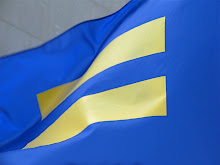He got that flag
many years ago
in the woods of
Bard,
displaying the
rainbow prominently
in his dorm,
self-expression
blossoming.
He has displayed
it since,
through moves,
through tragedy,
when fear and
uncertainty settled
in his body.
But he's taken it
down, just over a
week now,
when I came home
one night it was
gone, replaced by
some minimalist
piece of "art,"
(in quotes because
it lacked soul).
And when I asked
him about this
switch, he replied,
with a disconcerting
smugness,
"I have grown up
now. I have settled
down. That flag is
just a relic."
I looked at him
but said nothing,
in that moment
the connection
we created years
earlier disconnected,
suddenly.
I have grown up now,
I repeated to myself,
I have settled down,
I couldn't let the words
leave me,
the flag is just relic,
I couldn't hold back
the tears.
He's abandoned it all:
uneven fireworks
display of self-discovery,
struggle as his occasional
lisp or soft handshake cost
him a job,
the faces,
voices,
minds
that ceased
to laugh, growl in anger,
or create wonders
because of the monster
lurking in civilization,
and the kids like
him, wiping cum off
hands at this hour,
who deal with that
monster daily.
(I weep harder
as I think about it.)
All lost,
history vanquished
in three short
sentences and
a simple action.
I can't believe he
doesn't realize what
he's done.
I found out he's
not the man I thought
he was, the man
I came to love in
my awkward days.
I am not sure if I
I will leave him,
(I still love him)
but I cannot live
with someone who
has forgotten,
someone who is,
even without knowing,
feeding the monster
that haunts and chases
a people.
I am not asking
him for a parade,
but to remember
we are not the same
and never will be.
As we age, history
doesn't die.
It only grows with
us, breathing and
shifting in our
own experiences and
collectively.
I am asking him
to remember and
put up that flag again.
Subscribe to:
Post Comments (Atom)

I like the themes a lot: history, memory, forgetting.
ReplyDeleteThere's particularly something there about "maturity" and the whole idea that "maturity" means being more normative...
I think that loss and forgetting history figures prominently into queer culture. Older queer men who have lived through AIDS seem to be forgetting major events that have occurred in "queer history." This is nothing involuntary; rather, these men have ignored history because it is painful, because it disrupts any notions of comfort, exposing the full face of the monster lurking in humanity.
ReplyDeleteThese assimilationist politics reflect the larger problem that is occurring among queer youth today. Far from the so-called increasing acceptance of queers based in marriage "equality", I think that the unapologetic gay bashing and bullying demonstrates the ill-effects of this denial of history (which is inspired, in part, by "Feeling Backward" and partly by the piece @harveymilk wrote entitled "Levity and Gravity.")
To deny history only creates psychical uncertainty and distress; history never goes away. The feelings of loss, shame and guilt are not gone in this denial. History is not some dead Truth of past events, but informs the present in so many respects. It's literally alive with each breath we take.
And so I wonder what the full consequences of this denial by an older generation are. Who teaches the kids history? Who mentors them? Is the idea that is pushed "that we are like everyone else" and that our "love is equal" problematic? On a basic level, yes, we do want to be loved and love, but how is that love defined and constrained through a heteronormative matrix? What about those who want to be fluid in who they love? Can anybody love multiple people at the same time? Are you viewed like some zoo animal when you walk down the street holding your lover's hand or when you go in for a kiss?
And so on and so forth. The intersectionality of queer history, loss and erasure; the psyche (and deconstructing theories of psychology which have victimized and dehumanized queer people); LGBT politics nationally and locally; youth; personal experiences as queer man; and academic meditations on gender, class, race, etc. really have informed what appears to be a rather simple piece on the surface.